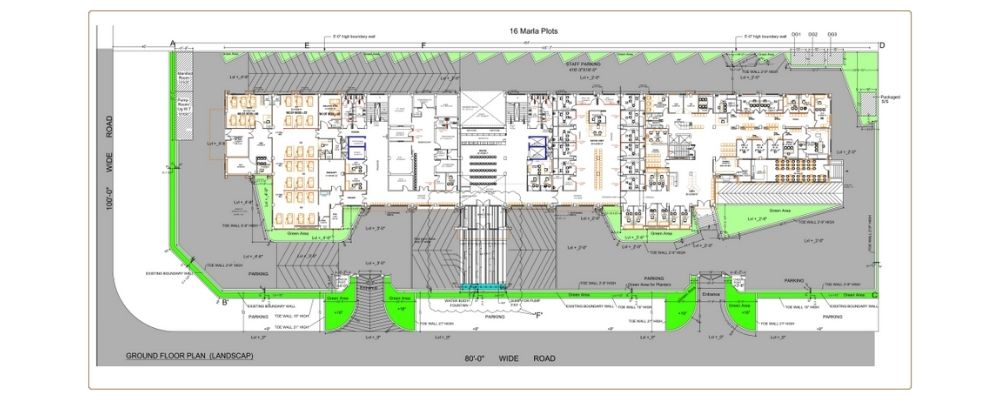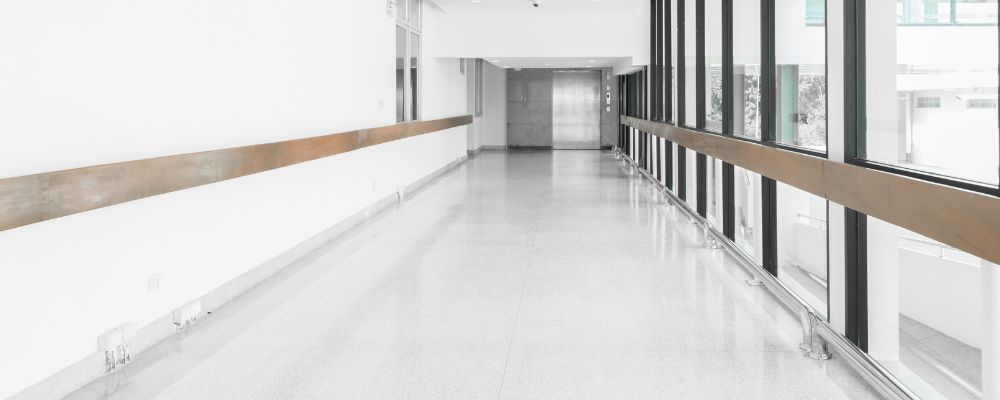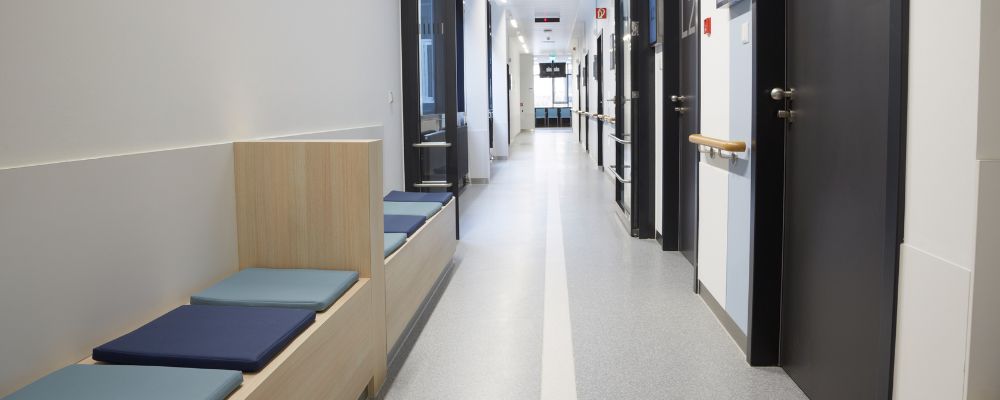When it comes to designing hospitals or other healthcare facilities, it’s not just about the walls, ceilings, or doors; the floors are also one of the most important parts on which the smooth functioning of a hospital depends. Therefore, choosing the best design for hospital flooring is also crucial. A hospital interior designer plays a vital role in selecting the right flooring materials that meet the functional and aesthetic requirements of healthcare environments.
In this blog, we will explore the best flooring options available for hospitals, keeping in mind the specific requirements of healthcare environments. Moreover, we will also look at the factors that one should consider before choosing the flooring design for their hospital or other healthcare facility. A well-thought-out hospital floor plan design, often guided by a healthcare interior designer, plays a crucial role in ensuring safety, hygiene, and comfort for patients, staff, and visitors alike.
Key Factors to Consider Before Choosing Hospital Flooring Design

Before choosing the design for hospital floors, consider the below factors that can help you to decide better:
- Durability: Hospital floors get a lot of foot traffic, including the movement of heavy medical equipment, wheelchairs, and more. Therefore, hospital floors should be highly durable and do not require frequent repair or replacements.
- Slip Resistance: Hospital floors should be non-slippery, resulting in the prevention of accidents or serious injuries. These floors should be slip-resistant, especially in wet areas.
- Ease of Cleaning: Hospital floors should be made up of materials that are easy to clean and are chemical resistant, as regular cleaning and disinfectant are crucial in hospitals, especially in operating rooms.
- Aesthetics: The smooth functioning of the hospital is crucial, but aesthetics such as soothing colors, biophilic elements, etc. also play an important role. It helps in improving the overall experience of patients and creating a calmer environment.
- Comfort: Hospitals are one of the most chaotic places, and healthcare professionals need to run here and there to attend to all their patients with utmost care. Therefore, hospital flooring material should provide comfort that helps in the reduction of fatigue in staff.
Best Hospital Flooring Design Ideas
1. Vinyl Flooring: Practical and Affordable
Vinyl flooring is one of the best ideas used by many healthcare professionals in their hospitals. This flooring is cheaper compared to others and is made up of a strong material that is easy to clean and maintain. It is available in various colors and patterns, so one can choose as per their choice. Vinyl flooring can be used in patient rooms, hallways, corridors, and waiting areas.
Why To Consider:
- Vinyl floors provide comfort to the feet of healthcare professionals, making them more relaxed and helping them to stand for long hours.
- This flooring does not cost too much.
- Vinyl floors can absorb water easily.
2. Rubber Flooring: Safe and Quiet

Rubber Flooring is a great option for hospital areas like emergency rooms, operating rooms, and rehabilitation centers, where safety is one of the biggest concerns. This flooring can withstand the toughest conditions without compromising the style of the hospital.
Why to Consider:
- Rubber floors’ main benefit is that they are non-slippery, making them safer for everyone.
- This flooring feels soft on the feet and helps in reducing the risk of accidents.
- Rubber possesses the property of absorbing noise. Therefore, rubber floors in hospitals make them quieter and help the patients to rest peacefully.
3. Linoleum Flooring: Natural and Strong
Linoleum flooring is made up of natural materials making it more sustainable. This flooring has strong antimicrobial properties that make it a great option for hospitals. Linoleum floors is most suitable for patient rooms, offices, and corridors.
Why to Consider:
- Linoleum floors are eco-friendly which not only creates a hospital visually appealing but also contributes to a healthier environment.
- Highly durable and can support a lot of heavy foot traffic.
- Due to its antimicrobial properties, it helps them to keep the germs away.
4. Porcelain Tile Flooring: Resilient and Durable
Porcelain tile is another highly resilient and durable material that can easily support heavy foot traffic in hospitals.
Why to Consider:
- Porcelain flooring is easy to clean and needs low maintenance
- Porcelain tile flooring is slip-resistant.
- They are available in different colors, textures, and patterns
5. Epoxy Flooring: Strong and Seamless
Epoxy flooring is one of the strong and long-lasting options. It’s a smooth, seamless surface that’s perfect for areas where cleanliness is crucial, like operating rooms. It can be used in operating rooms, laboratories, and pharmacy areas.
Why to Consider:
- Epoxy flooring consists of no gaps, which makes it easy to clean and free from germs.
- Epoxy is resistant to chemicals and stains, making it ideal for busy hospital areas.
- You can choose different colors and patterns to match your hospital’s style.
Conclusion

To wrap up, choosing the right flooring for hospitals is a decision that needs to be made by considering all the factors important that do not affect the overall functioning of the hospital.
Are you still confused about which flooring should you use in your hospital? Don’t worry!
We at SkyDec Engineers are here to help you with the design of your healthcare facilities. Whether you need to create a dental clinic, or just want to upgrade the operation theater, our team of skilled professionals is always there to help you at every step.
Contact us at +91 9818153338 and our team will help you find the best flooring design for your hospital space.
